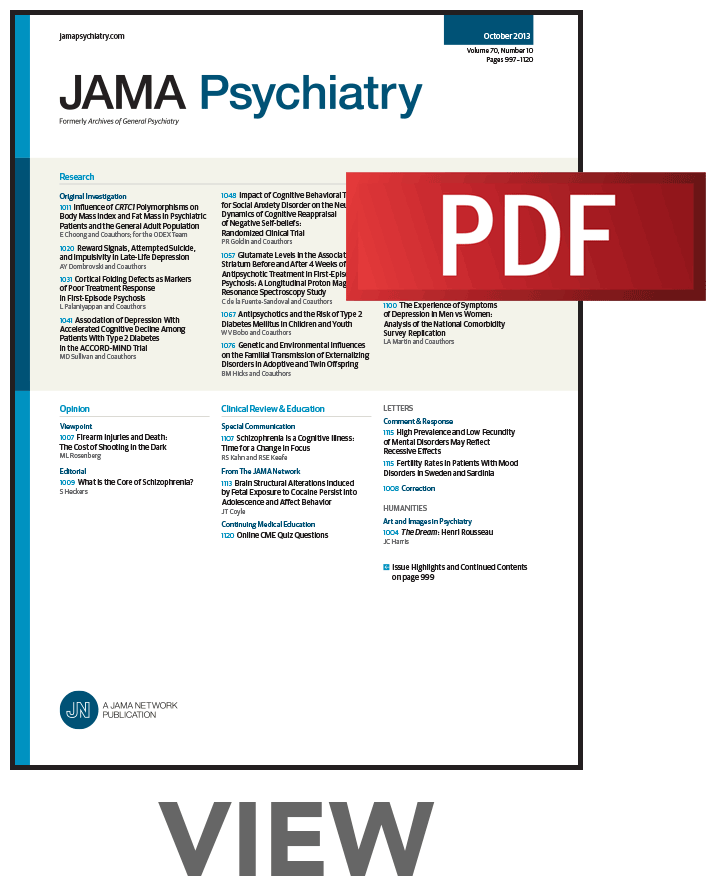近期接受和未接受抗精神病药物治疗的个体急性期治疗:个体参与者数据荟萃分析
IF 17.1
1区 医学
Q1 PSYCHIATRY
引用次数: 0
摘要
重要性据推测,急性期抗精神病药物治疗(与安慰剂相比)与预后之间的关联可能在近期未接受治疗的个体中比近期接受治疗的个体更大。然而,证据仍然缺乏。目的比较抗精神病药(与安慰剂)急性期治疗与近期未接受治疗个体与近期接受治疗个体预后之间的关系。数据来源耶鲁大学开放数据访问项目的数据库从成立到2024年4月16日(PROSPERO CRD42021224350)进行了搜索。研究选择:我们纳入了安慰剂对照的抗精神病药物急性期随机临床试验,参与者为18岁及以上的精神分裂症或分裂情感性障碍患者。参与者被分为两组:最近接受治疗(在随机治疗开始前接受抗精神病药物治疗)和最近未接受治疗(在随机治疗开始前未接受治疗≥4周)。数据提取和综合采用多元线性回归模型来估计平均差异(DMD)的差异,定义为最近未接受治疗的平均差异(抗精神病药与安慰剂)减去最近接受治疗的平均差异,以及每个研究的95%置信区间。采用随机效应荟萃分析模型综合各研究的DMD和95%置信区间。主要结局和测量主要结局是总体症状(6周后阳性和阴性综合征量表[PANSS]评分)。结果共纳入470项试验,其中12项符合分析条件。共有692人被纳入最近未接受治疗的组,随机分为抗精神病药组(n = 502)或安慰剂组(n = 190), 2089人被纳入最近接受治疗的组,随机分为抗精神病药组(n = 1513)或安慰剂组(n = 576)。总体中位(IQR)年龄为38(30-48)岁,女性998例(35.9%)。在最近未接受治疗和最近接受治疗的个体中,没有发现抗精神病药和安慰剂结果的差异(DMD, 0.8 PANSS点;95% CI, -3.6 ~ 5.2)。与最近接受治疗的个体相比,未接受治疗的个体服用抗精神病药物和安慰剂的结果更好。结论和相关性在这项个体参与者数据荟萃分析中,抗精神病药(与安慰剂)急性期治疗与结果之间的关联在近期接受和未接受治疗的个体中可能相似。与最近接受治疗的个体相比,最近未接受治疗的个体使用抗精神病药物和安慰剂的结果更好。本文章由计算机程序翻译,如有差异,请以英文原文为准。
Antipsychotic Acute-Phase Treatment in Individuals With and Without Recent Treatment: An Individual Participant Data Meta-Analysis.
Importance
It has been hypothesized that the association between acute-phase treatment with antipsychotic (vs placebo) and outcomes might be larger in individuals who were not recently treated compared to recently treated individuals. However, evidence is still lacking.
Objective
To compare the association between antipsychotic (vs placebo) acute-phase treatment and outcomes in individuals who were not recently treated to recently treated individuals.
Data Sources
The Yale University Open Data Access Project's database was searched from inception to April 16, 2024 (PROSPERO CRD42021224350).
Study Selection
We included placebo-controlled antipsychotic acute-phase randomized clinical trials with participants with schizophrenia or schizoaffective disorder aged 18 years and older. Participants were divided into 2 groups: recently treated (treated with an antipsychotic before the start of randomized treatment) and not recently treated (not treated for ≥4 weeks before the start of randomized treatment).
Data Extraction and Synthesis
Multiple linear regression models were implemented to estimate difference in mean difference (DMD), defined as mean difference (antipsychotic vs placebo) in not recently treated minus mean difference in recently treated, and 95% confidence intervals in each study. DMD and 95% confidence intervals were synthesized across studies using a random effects meta-analysis model.
Main Outcomes and Measures
The primary outcome was overall symptoms (Positive and Negative Syndrome Scale [PANSS] score after 6 weeks).
Results
A total of 470 trials were identified, of which 12 were eligible for the analysis. A total of 692 individuals were included in the not recently treated group and randomized to antipsychotic (n = 502) or placebo (n = 190), and 2089 individuals were included in the recently treated group and randomized to antipsychotic (n = 1513) or placebo (n = 576). Overall median (IQR) age of included individuals was 38 (30-48) years, and 998 individuals (35.9%) were female. No evidence of difference in the antipsychotic vs placebo outcomes was detected across the not recently treated and recently treated individuals (DMD, 0.8 PANSS points; 95% CI, -3.6 to 5.2). Not recently treated individuals had better outcomes with both the antipsychotic and placebo compared to recently treated individuals.
Conclusions and Relevance
In this individual participant data meta-analysis, the association between antipsychotic (vs placebo) acute-phase treatment and outcomes may be similar in individuals with and without recent treatment. Individuals who were not recently treated had better outcomes with both the antipsychotic and placebo compared with recently treated individuals.
求助全文
通过发布文献求助,成功后即可免费获取论文全文。
去求助
来源期刊

JAMA Psychiatry
PSYCHIATRY-
CiteScore
30.60
自引率
1.90%
发文量
233
期刊介绍:
JAMA Psychiatry is a global, peer-reviewed journal catering to clinicians, scholars, and research scientists in psychiatry, mental health, behavioral science, and related fields. The Archives of Neurology & Psychiatry originated in 1919, splitting into two journals in 1959: Archives of Neurology and Archives of General Psychiatry. In 2013, these evolved into JAMA Neurology and JAMA Psychiatry, respectively. JAMA Psychiatry is affiliated with the JAMA Network, a group of peer-reviewed medical and specialty publications.
 求助内容:
求助内容: 应助结果提醒方式:
应助结果提醒方式:


